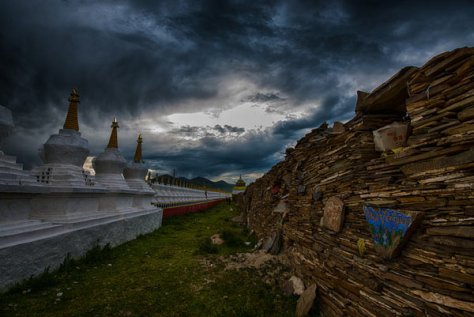I love taking random pictures and this is what I was doing again during my last trip while walking in the remote village of Uttarakhand. I took the picture of inscribed colored stones outside the monastery and shared with some thoughts on my social media handle (Instagram). The picture got some appreciation but equally had too many questions around it. The majority of friends and igers wanted to know- What are these colored stones and what do they represent? Are they for good fortune or something else? Do one need to buy them? So, to answer all those entire questions here is a short write-up on the inscribed colored prayer stones also known as Mani Stones.
Table of Contents
About Coloured Mani Stones
The Mani stones are flat colored stones/rocks with an inscription of Tibetan Buddhist Prayers on it. The writing is a six syllable mantra; “OM MANI PADME HUM”; for which the simple translation is Hail to the Jewel in the Lotus. All these six syllables of mantras are painted in different colors, as you can see in the picture. Apart from this mantra, some mani stones are carved with devotional images and sacred animals.

Where will you find these Mani Stones?
The Mani stones are found in the Himalayan regions where Tibetan Buddhism is practiced. They are intentionally placed by Buddhist devotees on the various significant landscapes such as the entrance to the villages, near monasteries, along with the trekking trails or near rivers.

Shape and Size of Mani Stones
There is no fixed shape and size for these sacred carved stones. The size of stone varies from small to large, and there can be single to multiple stones at a place. At times the Mani stones are placed on top of one another to form mounds and the height of these can go as high up to 1-2 meter. Further, these mounds on the top are decorated with Yak and Sheep horns and are worshiped by villagers.

At some places in the Himalayas, one can find Mani stone walls too. These walls can extend in length to Kilometres and in height to several meters.
Significance of Mani Stones
In Buddhism, people have a belief that spirits dwell in the significant locations. So, to maintain peace, prosperity and good health, these colorful stones are laid. Further, they say that whenever you encounter these Mani stones on your way; always makes sure that you pass them to left (clockwise direction). And the reasoning for the same is that this is how our universe spins and one should go in accordance with that.
Some of the believers when encounters a mani stone mound on their way, pick a stone, touch it to their forehead, chant some prayers and add it to the existing stack. So, the size of existing mound keeps on growing taller and taller.
Few followers consider these Mani stones as Patron Saints and they place them in their house or carry them along on their journey.
%CODE3%
Who makes these Mani Stones?
The Mani stones are handcrafted only in winters, by the people who work as peasants or herdsmen during summer, spring and autumn season.
Some Interesting Facts about Mani Stones
1. The world’s Largest Mani Stone Mound
The world’s largest Mani stone mound is located at Xinzhai Village of Yushu Tibetan Autonomous Prefecture in the northwestern province of, Qinghai, China. The mound here is believed to be built 200 years back by first living Buddha of Jiana and now it has 2.5 billion colored inscribed stones in it.

2. The world’s largest Mani stone wall
The world’s largest Mani stone wall, known as Bage Mani stone wall is located in Sershul County, of Garze Tibetan Autonomous Prefecture. The first stone of this wall was laid back in 1671 and till today thousands of pilgrimages are adding stones to it. So, the result is- this wall stretches up to 1.75 kilometers in length and 3.5 meters in height. It has more than 3000 stone statues and 6000 Buddhist scriptures.

P.S – Apart from being beautiful colored, they are sacred prayer Mani stones. So, we all should respect and pray to them as per the traditions and cultures of the region.
Interesting! If yes, then please share it with fellow travelers to know the story and significance of these colored Mani stones.
%CODE3%


You must be logged in to post a comment.